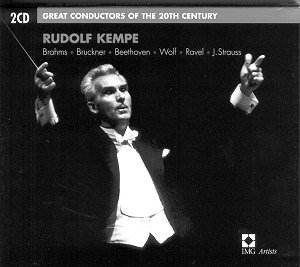Rudolf Kempe was a much loved figure in Great
Britain, where he was twice offered the conductorship of Covent
Garden and where he was the Royal Philharmonic’s own choice as
a successor to Beecham (a choice approved by the great man himself).
Somewhat mysteriously, he moved to the BBC Symphony Orchestra
at the end of his life. In continental Europe, after an opera-based
start, he held posts with the Zurich Tonhalle and the Munich Philharmonic
Orchestras and was a frequent guest in Vienna and Berlin. He also
conducted at the Metropolitan but I think I am right in saying
that American listeners knew him principally through his records.
I have to say that the one concert I actually
attended conducted by Kempe did not impress me especially. A few
encounters with his discs in my student years did little for me
either, so I came to regard his reputation with a degree of suspicion.
Another downside was that, while the RPO loved him and played
well when he was conducting (as they do here), he was not a great
orchestral builder. The RPO was the least considered of the big
London four during his stewardship (a situation remedied when
Dorati took over); nor did the orchestras of Zurich and Munich
suddenly transform into world-beaters (but again, the latter play
superbly in the three items here).
When writing of the issue in this series dedicated
to van Beinum I pointed out that the onus was on the compilers
to provide the evidence that their chosen subjects were, in fact,
"Great Conductors of the 20th Century". With
regard to van Beinum, I felt that the case was not proved. Here,
I am happy to say, the evidence is overwhelming.
"Dedication" is a word often used of
Kempe, and sometimes that can be a euphemism for mushy attack
and weakly structured interpretations. So listen to the dramatic
force with which the Tragic Overture is launched – nothing mushy
about this, and the contrasting material is handled with exquisite
tenderness. Furthermore, while Kempe plays up the contrasts more
than most conductors in this piece, he also keeps the overall
structure firmly in sight.
If the Brahms is masterly, the Bruckner is more
remarkable still. It is a very pure-headed performance, based
on broad tempi and transparent textures (the sound is always limpidly
beautiful). Without making any apparent interpretative points,
the music is allowed to unfold with a naturalness which few conductors
attain. Each new paragraph seems somehow to emerge from silence
and then finish in silence. Apart from a shaky start to the scherzo
the orchestra plays marvellously, so this joins the benchmark
versions by Klemperer, Böhm and Karajan.
The Beethoven, very finely played and recorded,
is more controversial, with a slow movement stretching to 17’
28" (Klemperer’s 1955 version took 14’ 43"). In spite
of some blazing climaxes it is essentially a rather gentle performance,
more flowing than driving, again very clear-textured and with
some extremely detailed phrasing which opens up unaccustomed vistas.
A number of moments came as a complete revelation, and how often
can you say that of a work as familiar as this? But I don’t want
to give the idea that the performance is a collection of moments;
thanks to Kempe’s sense of flow it all coheres very well. I’m
not going to forego all the more traditionally furrow-browed,
driving versions in my collection, but this Eroica for those with
"time to stand and stare" is to be treasured.
The Italian Serenade is absolute perfection.
This same piece appeared in the volume dedicated to Boult and
it was the one piece there over which I expressed some reservations,
finding it too pressured. Oddly enough, Kempe’s basic tempo is
faster but thanks to the flexibility with which he negotiates
the transitions his actual timing is almost a minute longer. There
is no sense of haste here; everything has a delicate, relaxed
and affectionate charm. I don’t think I’ve ever enjoyed the piece
so much.
The Ravel comes as a reminder that Kempe’s repertoire
was not by any means limited to the Austro-German classics which
he was most frequently asked to record. The opera he conducted
most often in the course of his career was, believe it or not,
Carmen, and the Vienna State Opera knew him as a specialist in
Verdi. At the time of his death Decca had contracted him to record
all 15 symphonies by Shostakovich – he would have been the first
conductor outside Russia to have done so (this honour then went
to Bernard Haitink). In 1962 he conducted Delius at the Bradford
Festival and his handling of the composer was much admired. I
think we can deduce from the present Ravel performance that he
would have been a very fine interpreter of Delius, for it is beautifully
relaxed and warm, the sunrise patiently unfolded, but perhaps
lacking the coiled nerves which lie behind much French music.
The Danse générale does show, however, that Kempe
could produce energy when called for.
I have elsewhere criticised the tendency in this
series to throw in lightweight fillers that tell us little about
the conductor in question. However, when you have a Strauss polka
which combines humour and verve with elegance and refinement as
this one does, it is another matter, for this helps to complete
the portrait of Kempe’s musical personality.
Altogether this album seems to mark one of the
highpoints of the series. If you are not acquainted with Kempe’s
work, or if you have doubts about his stature, the evidence presented
here is incontrovertible and will probably encourage you to investigate
further. And if you are already a firm admirer of this conductor,
there are some important new issues awaiting you.
Christopher Howell
See Also: Great
Conductors of the 20th Century

